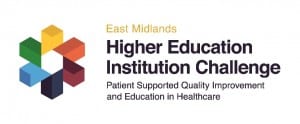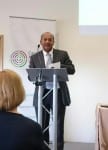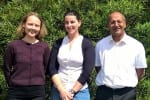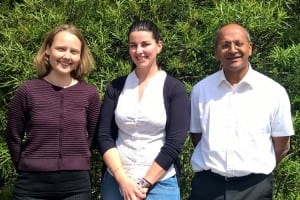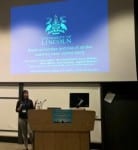The Higher Education Institution (HEI) Challenge for Patient Supported Quality Improvement and Education in Healthcare held its Patient and Public Involvement Working Group Conference at Loughborough University on 1st October 2015. This collaborative event formed a central part of the HEI Challenge. Led by the Patient and Public Involvement working group, the overall aim of the event was to provide a forum to focus and share achievements and help identify how Universities can support developments for the future; locally, regionally and more widely.
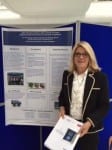 Who Attended? Just over fifty people attended the event, bringing together both staff and service user perspectives. Participating universities were represented by staff, service user and learner voices. People travelled from across the region from a range of voluntary and service user led organisation including; Healthwatch Nottinghamshire, British Heart Foundation National Centre for Physical Activity and Health, Leicester – Loughborough Biomedical Research Unit, CLASH – MSK, Alzheimer’s Action Alliance, Diabetes UK, and the Carers Federation.
Who Attended? Just over fifty people attended the event, bringing together both staff and service user perspectives. Participating universities were represented by staff, service user and learner voices. People travelled from across the region from a range of voluntary and service user led organisation including; Healthwatch Nottinghamshire, British Heart Foundation National Centre for Physical Activity and Health, Leicester – Loughborough Biomedical Research Unit, CLASH – MSK, Alzheimer’s Action Alliance, Diabetes UK, and the Carers Federation.
 The HEI Challenge Award 2014-15, from the East Midlands Academic Health Science Network, is a unique opportunity for East Midlands Universities to foster a sustainable approach to working collaboratively for the benefit of our population and to drive positive experiences and outcomes for learners and local employers. The ultimate goal of the HEI Challenge is to collaboration to share, develop, showcase and spread work across East Midlands and surrounding Universities around the unifying topic of healthcare quality improvement.
The HEI Challenge Award 2014-15, from the East Midlands Academic Health Science Network, is a unique opportunity for East Midlands Universities to foster a sustainable approach to working collaboratively for the benefit of our population and to drive positive experiences and outcomes for learners and local employers. The ultimate goal of the HEI Challenge is to collaboration to share, develop, showcase and spread work across East Midlands and surrounding Universities around the unifying topic of healthcare quality improvement.
 Overview and highlights of the day: Conference delegates were welcomed to the event by Kristen Clements. Together Kris and Rhian Last co lead the PPI working group. The day began with a two presentations on that addressed the HEI challenge for patient supported quality improvement and education in healthcare. Rachel Hawley, Project Manager began by providing an overview of the Challenge to set the context for the day. Professor Niro Siriwardena showcased examples of patient supported quality improvement.. Participants engaged in group discussions to explore what patient supported quality improvement means to them and their organisation, each working group capturing its essence in ways that will inform future guiding principles for practice.
Overview and highlights of the day: Conference delegates were welcomed to the event by Kristen Clements. Together Kris and Rhian Last co lead the PPI working group. The day began with a two presentations on that addressed the HEI challenge for patient supported quality improvement and education in healthcare. Rachel Hawley, Project Manager began by providing an overview of the Challenge to set the context for the day. Professor Niro Siriwardena showcased examples of patient supported quality improvement.. Participants engaged in group discussions to explore what patient supported quality improvement means to them and their organisation, each working group capturing its essence in ways that will inform future guiding principles for practice.
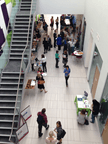 The Street Activity: The lunch time period was filled with conversations and emerging collaborations. Ten service user led / voluntary sector organisations gathered in ‘The Street’ to participate in activities aimed at stimulating conversations, hopefully leading to new collaborative projects. Participants were invited to submit project ideas to be awarded funding – further information about these projects will be shared soon. Participants engaged in a range of activities along the way; from stepper machines, to Bollywood dancing.
The Street Activity: The lunch time period was filled with conversations and emerging collaborations. Ten service user led / voluntary sector organisations gathered in ‘The Street’ to participate in activities aimed at stimulating conversations, hopefully leading to new collaborative projects. Participants were invited to submit project ideas to be awarded funding – further information about these projects will be shared soon. Participants engaged in a range of activities along the way; from stepper machines, to Bollywood dancing.
The afternoon began by moving into workshops activities on the following themes:
 Involvement and Inclusion in action: Shahnaz Aziz, EM-AHSN; Theo Stickley, University of Nottingham and and Julie Gosling, Making Waves
Involvement and Inclusion in action: Shahnaz Aziz, EM-AHSN; Theo Stickley, University of Nottingham and and Julie Gosling, Making Waves- Bridging the gap for involvement in research, education and practice: Andrew Grundy, Nottingham University and Elizabeth Rye SUCRAN
- To train or not to train? The development for involvement: Paula Wray CLAHRC
- Assessment of impact – The value of patient stories: Rachel White – NHS England
Keynote Showcase: Transformational change and social innovation
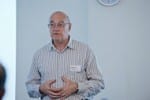 The final session showcased staff and service users coming together to share their experiences through two presentations; Phil Smith, Kidney patient champion, Emma Watson, Kidney patient centre representative along with SCAD team members, Rebecca Pritchard and Catherine Beck. Experiences were shared that clearly showed the benefits of patient supported quality improvement in action; for staff, for service users and for the organisation.
The final session showcased staff and service users coming together to share their experiences through two presentations; Phil Smith, Kidney patient champion, Emma Watson, Kidney patient centre representative along with SCAD team members, Rebecca Pritchard and Catherine Beck. Experiences were shared that clearly showed the benefits of patient supported quality improvement in action; for staff, for service users and for the organisation.
A participant said: “That was a fantastic event. I thought the blend of academic input and service user experience was just right. Some of these events are valuable but exhausting. This time I found it valuable and energizing – and much more determined to push harder“.
[su_document url=”https://communityandhealth.dev.lincoln.ac.uk/files/2015/10/PPI-Event-Report_FINAL-.pdf” responsive=”no”]Multi-morbidity, goal-oriented care, the community and equity[/su_document]
For further information or to get involved you can:
- If you are interested in finding out more about the HEI Challenge contact Rachel Hawley, Project Manager – rhawley@lincoln.ac.uk 07711 532512
- If you are interested in finding out more about the Patient and Public Involvement working group you can contact either Kristen Clements (K.M.Clements@lboro.ac.uk) or Rhian Last (R.Last@educationforhealth.org)
– We hope that you will help us continue the conversations:
Please follow us on Twitter:  @qi_learning
@qi_learning
Rachel Hawley
